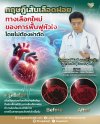Is Your Chest Pain a Sign of Heart Disease or Just Acid Reflux? Learn the difference before it's too late

Chest pain is a common symptom that can cause significant concern. While many associate it with heart disease, it's important to recognize that chest pain can stem from various causes, including acid reflux. Differentiating between these conditions is crucial, as they require different treatments and have varying implications for your health. This article aims to help you understand the distinctions between chest pain caused by heart disease and that resulting from acid reflux, enabling you to seek appropriate care promptly.
Understanding Chest Pain: Not Always a Heart Problem
Chest pain doesn't always signify a heart issue. Several systems in the body can produce chest discomfort, such as:
- Gastrointestinal system: Conditions like acid reflux or gastroesophageal reflux disease (GERD)
- Musculoskeletal system: Muscle strains or inflammation of the chest wall
- Respiratory system: Lung infections or pulmonary conditions
- Cardiovascular system: Heart-related issues like angina or heart attacks
Understanding the source of chest pain is essential for effective treatment.
Comparing Symptoms: Heart Disease vs. Acid Reflux
1. Nature of the Pain
- Heart Disease: Often described as a pressure, tightness, or squeezing sensation in the chest. The pain may radiate to the neck, jaw, shoulders, or arms. It typically occurs during physical exertion or emotional stress and subsides with rest.
- Acid Reflux (GERD): Characterized by a burning sensation behind the breastbone, often after eating. The discomfort may worsen when lying down or bending over and can be accompanied by a sour taste in the mouth.
2. Duration and Timing
- Heart Disease: Pain usually lasts a few minutes and may occur repeatedly, especially during physical activity.
- Acid Reflux: Discomfort can last for several hours and is often related to meals or specific foods.
3. Triggering Factors
- Heart Disease: Exertion, stress, or exposure to cold temperatures can provoke symptoms.
- Acid Reflux: Consumption of spicy, fatty, or acidic foods, overeating, or lying down soon after eating can trigger symptoms.
4. Associated Symptoms
- Heart Disease: Shortness of breath, nausea, lightheadedness, cold sweats, and fatigue may accompany chest pain.
- Acid Reflux: Regurgitation, bloating, burping, and a sour or acidic taste in the mouth are common.
Diagnostic Approaches
If you're experiencing chest pain, medical evaluation is essential. Healthcare providers may utilize the following diagnostic tools:
- Electrocardiogram (ECG): Assesses the heart's electrical activity to detect abnormalities.
- Stress Testing: Evaluates heart function during physical exertion.
- Echocardiogram: Uses ultrasound to visualize heart structures and assess function.
- Endoscopy: Examines the esophagus and stomach to identify signs of acid reflux or other gastrointestinal issues.
Treatment Options
For Heart Disease
Treatment depends on the severity and type of heart condition and may include:
- Medications: Such as nitrates, beta-blockers, or antiplatelet agents.
- Lifestyle Changes: Including diet modifications, exercise, and smoking cessation.
- Procedures: Like angioplasty or coronary artery bypass surgery in severe cases.
For Acid Reflux
Management focuses on reducing stomach acid and preventing reflux:
- Medications: Antacids, H2 blockers, or proton pump inhibitors.
- Lifestyle Modifications: Eating smaller meals, avoiding trigger foods, not lying down after eating, and elevating the head during sleep.
When to Seek Immediate Medical Attention
Chest pain should never be ignored. Seek emergency care if you experience:
- Sudden, severe chest pain
- Pain radiating to the arm, neck, jaw, or back
- Shortness of breath
- Nausea or vomiting
- Lightheadedness or fainting
- Cold sweats
Prompt evaluation can be life-saving, especially in cases of heart attacks.
Differentiating between chest pain caused by heart disease and acid reflux is vital for timely and appropriate treatment. While some symptoms overlap, understanding the nuances can guide you in seeking the right care. Always consult a healthcare professional if you experience unexplained or persistent chest pain. Early diagnosis and intervention can significantly improve outcomes and quality of life.


